The last time ‘Bernie the Pom’ (Bernie Nolan) appeared in our pages it was to tell us about his adventures in the Belgian kermises of the 70’s. But prior to that he sought fame and fortune in the Antipodes – under the Aussie sun and surely the racing down there wouldn’t be as savage as Belgium?
He had, of course, not realised that there were gentlemen down there like Don Allan, Danny Clark, Gordie Johnson and John Nicholson – the latter three would all become world champions with Mr. Allan going on to become a Six Day legend.
Read on…
* * *
By Bernie Nolan
It was 17th October 1969 when I left Manchester to emigrate to Melbourne, Australia. I was 19 years-of-age at the time just eager to get away. I was working for my Dad back then in the Greengrocery business, which I didn’t like.
It was only a year before that that he refused me permission to leave home and live in Belgium to earn my living as a racing cyclist, in retrospect a good thing; however the next year when I was moaning about the cold weather he said I could go and live in Australia (sounds odd doesn’t it).
I think it was because I went out to live initially with my Uncle Bill and his family in Melbourne. This I did for about a month until I got my first job as swimming pool life guard and cleaner.
I remember lying to the manager about my life saving credentials. The only time I was called upon was to help a young girl who was in difficulties. I just reached out with the broom handle and told her to grab it. Job done and I didn’t get wet.
However my aim was to get into the racing scene and get to Europe via the Munich Olympics. A bit of a long way round I know, but I was forever the optimist.
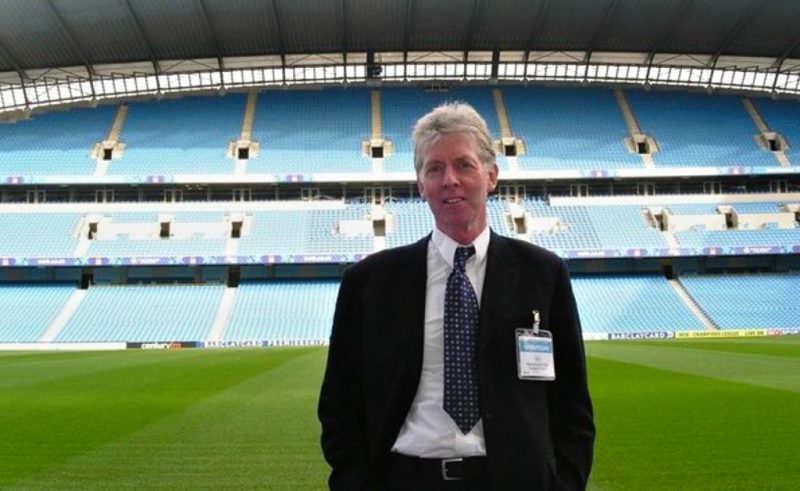
I discovered that the nearest club to me was the Carnegie Club which had its own track so off I went and joined.
It was a Mrs Salisbury who told me about the club and she also told me her son raced for Carnegie. She said they call him ‘The Snake.’ ‘The Snake’ I thought? Why would they call him that – the mind boggles?
When I first met him, he oozed confidence, and told me how good he was and how lucky I was to be talking to him.
The Snake turned out to be a good mate and an extra good trackie, but you could never tell him that.
Because it was November it was the beginning of the track season The track was a large shallow one that was in good shape – what struck me was that most clubs in the city had their own track, some good and some not so good. That gave rise to a lot of good track riders.
There were lots of track riders that were so good and I’d never heard of them, Hilton Clarke being one of them.
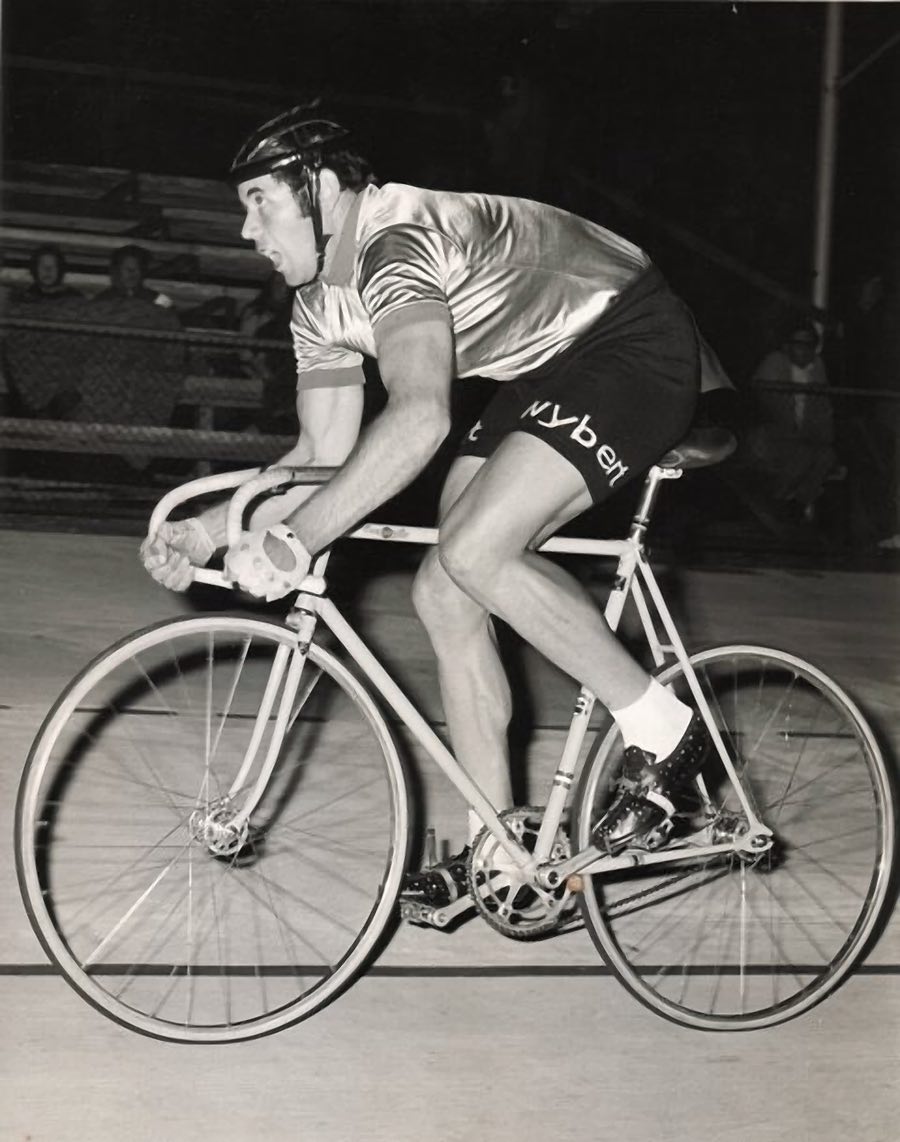
Then there was Gordie Johnson, John Nicholson, Don Allan (who was a road rider at the time) and Danny Clarke – who became world renowned a few years later as a world champion, along with Johnson and Nicholson.
In the summer you could ride your club track on Saturday afternoons and then the big meets at Brunswick on Saturday nights.
It was all really good.
I forgot to mention the old Melbourne velodrome near the city centre, which was a wooden track with vertical slats, which made a loud noise as you rode it.
Handicap racing was the main type of racing, with all the other events thrown in.
At Christmas there were the Tassie carnivals and country Meets like Euchuca, Bendigo and Ballarat.
If you were a decent rider you could make good money at these places, especially if you were in the winning ‘train’ as they called it, a group of riders worked together to get their man over the line first.
The racing was fast and furious with elbows and head butts – the lot.
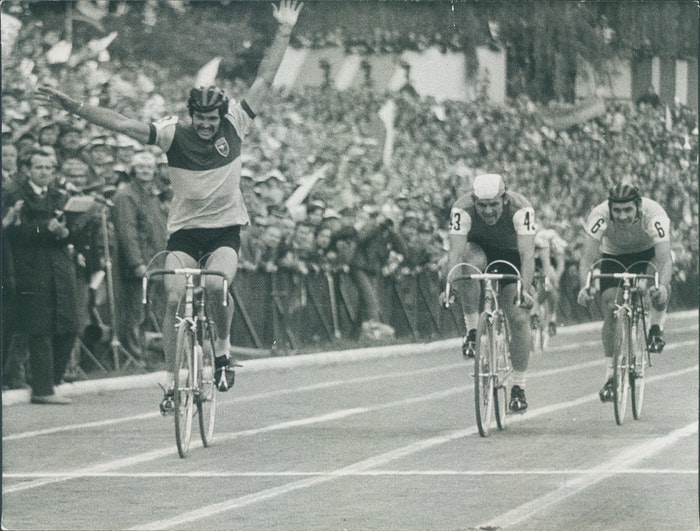
But my main thing was the road, where again it was handicap racing; this season ran from about May ’till October.
The racing was all place-to-place; the open events were every two weeks with the main handicap on the Saturday and a criterium on the Sunday, on the in-between weekends there were local combines where three or four clubs would get together and race.
These were also good races, mainly real road races and criteriums.
When I first arrived on the racing scene I was befriended by John Shields who told me he would “train me to be a champion”. Instead of asking who he’d trained before and just took him at his word and said, ‘okay.’
Sheildsy, as he was known, was a likeable nutcase (a bit like myself some might add). The training was a bit haphazard and after a few months it died a death.
He used to say things like; ‘You’ve got the souplesse,’ which left me in wonderment as to what he really meant. I was too embarrassed to say ‘what?’
[It’s French for ‘flexibility’ relating to a nice, supple, fluid pedalling style, ed.]
I could write a whole book on John Patrick Sheilds, but not here.
But like Sheildsy, the place was rammed full of interesting characters. My club had a few, so apart from the Snake there were the Hollingsworth brothers, Mick and Paul.
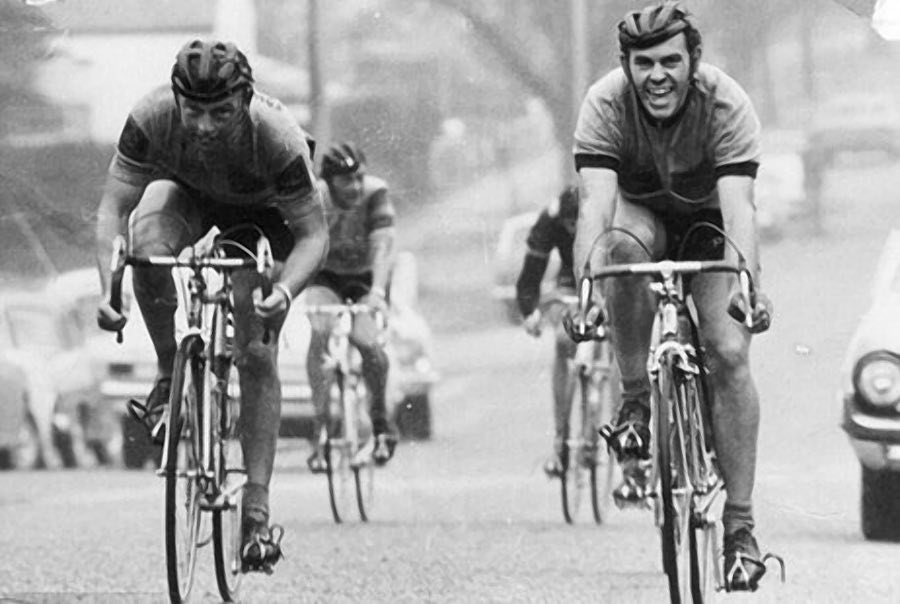
Mick had been to the Tokyo Olympics, as had Hilton Clarke. Hilton was a world class sprinter, stocky and very fast, and Paul turned out to be a good roadman, but not internationally.
We trained together a lot and had a similar sense of humour.
Paul was married to the lovely Lindi who is still a good friend to this day. It was Paul who told me to try and get a job as a Garbo (dustbin man) in the winter as the hours and pay were quite good. You started at 05:00 am and finished at 10:00 am.
That was the good part; the job itself left much to be desired. After an interview lasting all of 5.5 seconds I got the job.
On the first morning I rocked up at the depot and was put in a team of six, led by The Mad Dutchman.
The rules were that you were given a big plastic dustbin that was enough for two domestic dustbins worth of rubbish, then run (and I mean run) to the dustcart at the same time sorting out bottles and scrap metal which went a long way to almost doubling your wages.
After two streets I was exhausted, then after dumping my load into the cart The Mad Dutchman dived in after me and came out with a metal tea pot.
‘See that ?’ he said, ‘its metal and you make one more mistake like that and you’re out!’
The next mistake was about five minutes later.
When I got back to the depot I got the sack and a wave of relief passed over me.
The first track season came and went without too much excitement but because I always thought of myself as a roadie I was looking forward to my first road season which was in the Aussie winter, from about May to October.
Every two weeks there was an ‘open weekend’, these were the big races like Melbourne to Castlemaine and Dandenong to Morwell.
These races were always hard because you and your group were working hard together from the off. The idea was that the different groups were all supposed to meet up somewhere after the halfway stage.
In reality what happened was that whenever the scratch group caught your group you had to hang on in there; and often start working with them so at the end it was the scratch group plus another 10 riders or so.
Sometimes if it was a tailwind it would be difficult for the scratch group to make up the 30 mins or so to the limit group.
There were two main prizes, first past the post and fastest rider. So two riders could get this if it was say a tailwind but quite often one rider would get first and fastest.
Throughout my time in Oz it was usually Don Allan – who as many people know went onto bigger and better things in Europe, including 15 Six Day wins and a total of 41 Six Day podiums as well as stages in the Peace Race and Vuelta España.
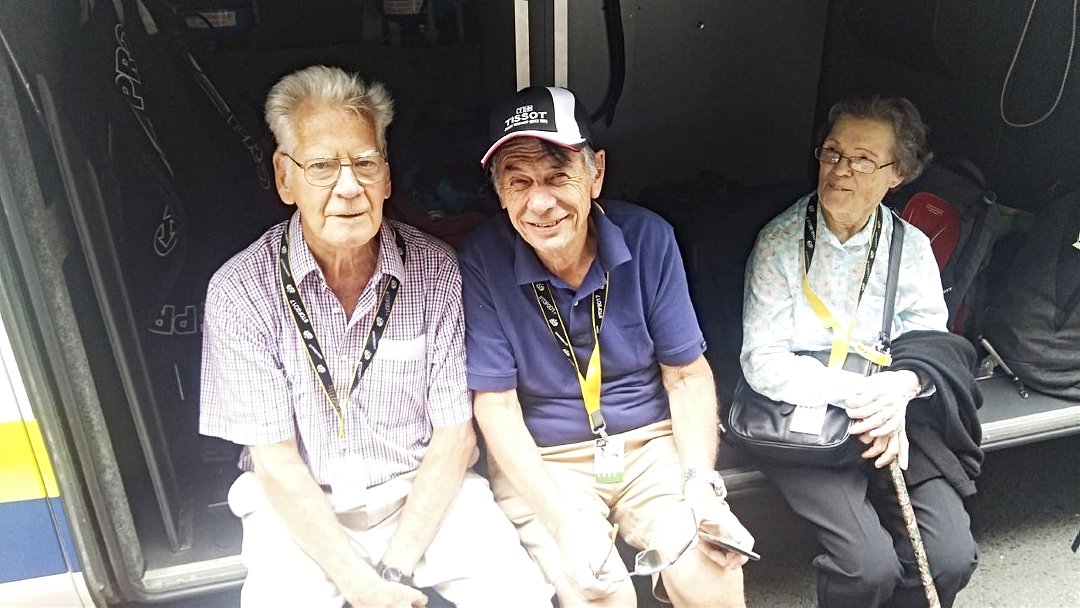
Also in the scratch bunch in those days were John (Iffy) Trevorrow, and Clyde Sefton (second in the Munich Olympic RR) and the fantastic Sansonetti twins, Remo and Sal.
It was the end of the 1970 season when Don had a bad car accident and many – including himself – thought he may never race again. However with the help of Keith Reynolds and a lot of will power, Don made it into the Munich Olympic team in ‘72.
I was usually in the third scratch group, I like to say this was because I was an unknown quantity… We were often caught somewhere between halfway and 15 K to go, with some of us finishing with the leaders. It’s a pity that I wasn’t a sprinter.
In my first Dandenong to Morwell I was in the final break of six; with about 10 miles to go thinking: ‘how am I going to play this?’ In the end I came sixth – with prizes down to fifth.
Another good race was the Melbourne to Castlemaine; again I was in the final five but with three miles to go I was dropped and just put my head down to get fifth.
Somehow that didn’t go too well as that last three miles actually went on for about 10 until I passed a sign saying Welcome to Bendigo. At that very moment my mate Stuey (the captain) Cook drove up to me and shouted ‘Hey Pom, ya f###ing Idiot, ya missed the turn.’
It turns out everyone but me knew the last turn and finished before me. Oh! How I had a go at the officials.
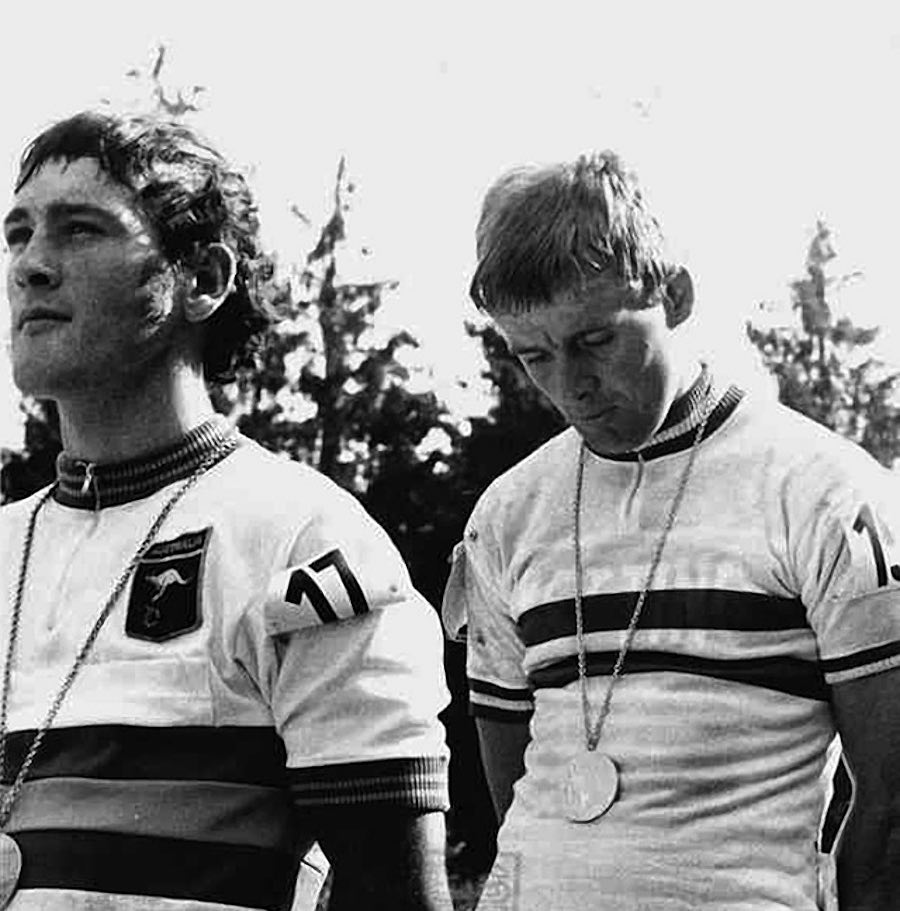
On the Sunday after the big race on the Saturday were the crits. These were usually A and B grade seniors, juniors and schoolboys. The whole town was taken over by the bike riders and their families and mates; people stayed in caravans, motels and hotels.
We used to book a room for two but with at least six ending up in the room – if you were lucky you got money from the others. At night we’d go out to eat followed by a nightcap at the local pub.
There was often a ‘blue’ [Aussie slang for disagreement, ed.] or what was known as a ‘Western’ [the Aussie slang dictionary couldn’t help with that one but we get the gist, ed.] where the locals would turn on the bikies, or vice versa. Some riders got a free night in the police cells, and breakfast if they were really lucky.
I only had one win in an Open and that was at Colac at the end of ‘71, where I got clear and stayed away.
In between these weekends there were ‘combines’ where three or four clubs would organise a road race; these were good races where I had more luck. I once won a three-day combine race in a place called Ararat. It was brilliant – in my eyes anyway.
The big tour for amateurs was the five Day Tour of Tasmania which I managed fifth on GC – it was a hard race and was very pleased with myself.
I was also in the two day Tour of Kangaroo Island (hit badly by the bush fires last year) it was amazing that they got two days of racing out of this place as there was only 25 miles of made road, so there were many miles of dirt road, which I quite liked and I came fifth.
It was won by local South Australian, Graeme Jose who tragically died a couple of years later in the Tour of Austria while riding for Australia.
In the Feb ‘72 there were the Victorian test races from which the top six usually got selected for the nationals. In those days Victoria was the top cycling state by far.
I trained for months for these and in the end over-trained and failed miserably. These two test races were 120 miles each, and the weather was hot, about 95 degrees.
I remember John Saunders winning the first of these, he wasn’t the favourite but took a flyer from about two miles out. He didn’t do too well in the second race so didn’t get into the team.
The Saunders family were lovely; dad Ted was great and would do anything for anyone. They had three sons John, Wayne and Dave. Dave is still one of the top Aussie coaches to this day.
My time in Australia was, I feel, the happiest time of my life, where I met many good mates who I’m still in contact with now.
My biggest mistake was not applying for citizenship. I was too impatient to get to Europe to be a pro. What was I thinking?
I ended up coming back to Europe and brought two mates with me; Tony Branchflower and Ian ‘Jacko’ Jackson. They wintered in Manchester, which I think that defeated them a bit…
* * *
Winter in Manchester, more rain in a week than most parts of Oz get in a year. With thanks again to Bernie for his tale.



